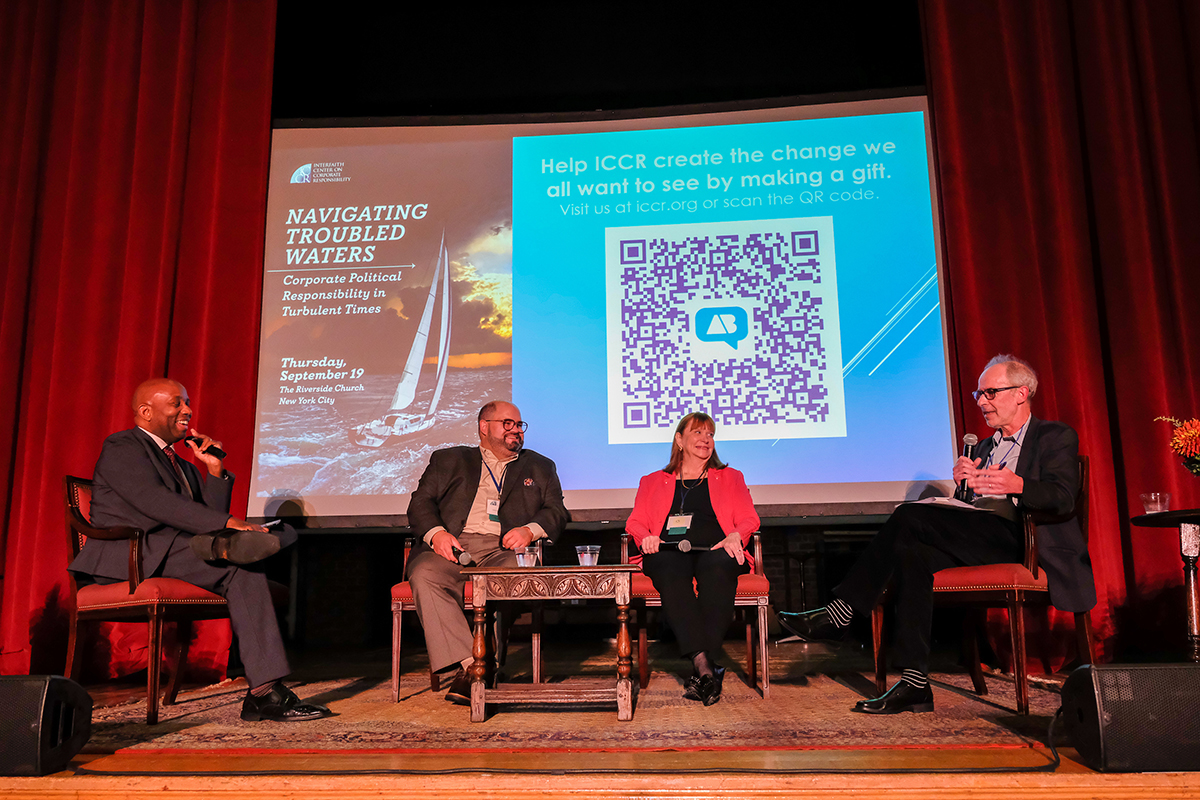In Wake of Jan 6, Investors Call on Companies to Re-Evaluate Whether Corporate Political Spending is in the Company’s – or the Public’s – Best Interest
THURSDAY, JANUARY 28, 2021 – Today the Interfaith Center on Corporate Responsibility (ICCR), a coalition of investors representing over $US 2 trillion in assets under management that engages companies on environmental, social, and governance issues, released a statement it sent to the CEO members of the Business Roundtable (BRT) urging them to refrain from political spending for six months in order to allow for a thorough assessment of its inherent risks.
The investors further urged corporations to use the hiatus to consider implementing more permanent steps to end all political spending including through direct donations to politicians, Political Action Committees (PACS), Super PACs, 527 committees or anonymously through trade associations and “social welfare” organizations (also known as 501(c)(4) groups). The statement was sent to CEO members of the BRT and is being circulated to investors for endorsement.
The statement is intended to prompt a thoughtful reckoning and due diligence by companies around the inherent risks of political spending not only to businesses, but to the broader political system and the public interest. According to the statement:
“The distortion of public policy and corrupting influence on our political system caused by corporate political spending has a destabilizing effect on the broader economic and cultural environment, inhibiting the long-term sustainability of business and threatening to unravel the social fabric.”
“While companies may perceive a short-term gain from funneling money to elected officials, the reputational risk that they face and, more critically, the corrosive effect on democracy of corporate money in politics should give them pause,” said Josh Zinner, ICCR’s CEO. “January 6th should have sounded the alarm: it is vitally important for companies to carefully evaluate the problematic impacts of their political spending.”
On the heels of the violent attack on the Capitol on January 6th and subsequent public outrage against the 147 members of Congress who voted against certifying the results of the Presidential election, many companies saw the reputational risks inherent in these donations and, as a result, have temporarily ended their support for the implicated legislators; another group of companies comprised of mainly banks and tech companies are suspending all spending, pending a more comprehensive review. According to Public Citizen, since 2016, these 147 members have received at least $170 million combined from corporate and trade group PACs[1].
The investors say these suspensions and reviews are good first steps, but bolder action is needed.
“Many corporations are urgently evaluating appropriate options for their companies related to political spending, a welcome and important step; this is a timely moment for an in-depth board review of these practices,” said Tim Smith of Boston Trust Walden. “Investors have long raised the issue of reputational risk for companies from controversial lobbying and political spending related to elections.”
ICCR members and other investors have long pressed companies for transparency around their political spending to curry influence on legislation, as a way to ensure accountability and consistency with their public messaging.
A soon to be published analysis of 2020 election cycle spending by the Fortune 250 from the Sustainable Investments Institute (Si2) found particularly partisan company-connected political spending, which runs counter to the popular narrative of bipartisan giving. Just seven companies gave more than $7 million to two Super PACs that overwhelmingly funded attacks on Democratic candidates for the U.S. House and Senate. Si2 also found that the vast majority of corporate-connected political contributions went to Republicans in the South (79% of state candidates and 69% of state party giving) and Midwest (64%).
“This could be an epiphany moment for companies,” said Bruce Freed of the Center for Political Accountability. “The level of risk they face from political spending has grown exponentially. New policies, including a code of conduct for political spending, are required to guide their decision-making and risk-evaluation as they consider how their spending impacts their companies, society and our democracy.”
About the Interfaith Center on Corporate Responsibility (ICCR)
Celebrating its 50th year, ICCR is the pioneer coalition of shareholder advocates who view the management of their investments as a catalyst for social change. Its 300-member organizations comprise faith communities, socially responsible asset managers, unions, pensions, NGOs and other socially responsible investors with combined assets of over $2 trillion. ICCR members engage hundreds of corporations annually in an effort to foster greater corporate accountability. Visit our website www.iccr.org and follow us on Twitter, LinkedIn and Facebook.
###









